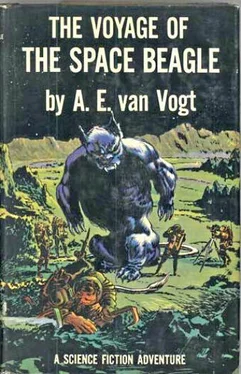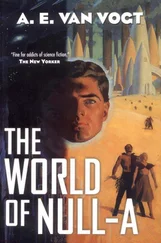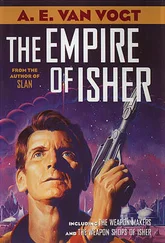There was a sharp click of metal on metal. With a gentle touch of one tentacle, Coeurl pushed open the door. Then he was out in the corridor. For a moment he felt a return of contempt, a glow of superiority, as he thought of the stupid creatures who dared to match their wits against a coeurl. And in that moment he suddenly remembered that there were a few other coeurls on this planet. It was a strange and unexpected thought. For he had hated them and had fought them ruthlessly. Now he saw that vanishing small group as his kind. If they were given a chance to multiply, no one — least of all these men — would be able to stand against them.
Thinking of that possibility, he felt weighted down by his limitations, his need for other coeurls, his aloneness — one against a thousand, with the galaxy at stake. The starry universe itself beckoned his rapacious, vaulting ambition. If he failed, there would never be a second chance. In a foodless world he could not hope to solve the secret of space travel. Even the builders had not freed themselves from their planet.
He padded along through a large salon and into the adjoining corridor. There he came to the first bedroom door. It was electrically locked, but he opened it noiselessly. He pounced inside and smashed the throat of the sleeping man in the bed. The lifeless head rolled crazily. The body twitched once. The id emanations from it almost overwhelmed him, but he forced himself to go on.
Seven bedrooms; seven dead men. Then, silently, he returned to the cage and locked the door behind him. His timing was beautifully precise. Presently, the guards came along, peered through the audioscope, and went on their way. Coeurl emerged for his second foray, and within minutes had invaded four more bedrooms. Then he came to a dormitory with twenty-four men sleeping in it. He had been killing swiftly, aware of the exact moment when he must again return to the cage. The opportunity to destroy a whole roomful of men confused him. For more than a thousand years he had slain all the living forms he could capture. Even in the beginning, that had yielded him no more than one id creature a week. And so he had never felt the necessity for restraint. He went through that room like the great cat he was, silent but deadly, and emerged from the sensuous joy of the kill only when every man in the dormitory was dead.
Instantly, he realized he had overstayed his time. The tremendousness of the blunder made him cringe. For he had planned a night of murder, each wave of deaths timed exactly so that he would be able to return to his prison and be there when the guards glanced in at him, as they had done on every round. That hope of seizing this monster ship during one sleep period was now jeopardized.
Coeurl caught at the vanishing remnants of his reason. Frantically, careless now of the accidental sounds, he raced through the salon. He came out into the cage corridor, tense, half expecting to be met by energy blasts too powerful for him to handle.
The two guards were together, standing side by side. It was obvious that they had just discovered the open door. They looked up simultaneously, briefly paralysed by the nightmare of claws and tentacles, the ferocious cat head and hate-filled eyes. Far too late, one of the men reached for his blaster. But the other was physically frozen by the doom he could not avoid. He uttered a shriek, a shrill cry of horror. The eerie sound floated along the corridors, awakening a shipload of men. The sound ended in a frightful gurgle as Coeurl flung the two corpses with one irresistible motion the full length of that long corridor. He didn’t want the dead bodies found near the cage. That was his one hope.
Shaken to the depths, conscious of his terrible mistake, unable to think coherently, he plunged into the prison. The door clicked softly shut behind him. Power flowed once more through the electric lock. He crouched down on the floor, simulating sleep, as he heard the rush of many feet and caught the sound of excited voices. He knew when someone actuated the cage audioscope and looked in at him. The crisis would come when the other bodies were discovered.
Slowly, he stiffened himself for the greatest struggle of his life.
“Siever gone!” Grosvenor heard Morton say. The Director’s voice sounded numb. “What are we going to do without Siever? And Breckenridge! And Coulter and — horrible!”
The corridor was packed with men. Grosvenor, who had come some distance, stood at the tail end of one overflow. Twice he tried to jostle through, but he was effectively jostled back by men who did not even glance around to identify him. They blocked his passage impersonally. Grosvenor gave up the futile effort, and realized that Morton was about to speak again. The Director looked out grimly over the throng. His heavy chin seemed more prominent than usual. He said, “If anybody’s got so much as a germ of an idea, bring it out!”
“Space madness!”
The suggestion irritated Grosvenor. It was a meaningless phrase, still current after all these years of space travel. The fact that men had gone insane in space from loneliness, fear, and tension did not make a special sickness of it. There were certain emotional dangers on a long voyage like this — they were among the reasons why he had been put aboard — but insanity from loneliness was not likely to be one of them.
Morton was hesitating. It seemed clear that he also regarded the remark as valueless. But it was not a moment to argue subtle points. These men were tense and afraid. They wanted action and reassurance and the feeling that adequate countermeasures were being taken. At such moments, directors of expeditions, commanders in chief, and others in authority had been known to lose permanently the confidence of their followers. It seemed to Grosvenor that those possibilities were in Morton’s mind when he spoke again, so careful were his words.
The Director said, “We’ve thought of that. Dr. Eggert and his assistants will examine everybody, of course. Right now, he’s looking at the bodies.”
A thunderous baritone bellowed almost in Grosvenor’s ear. “Here I am, Morton. Tell these people to make way for me!”
Grosvenor turned and recognized Dr. Eggert. Men were already crowding aside for him. Eggert plunged forward. Without hesitation, Grosvenor pushed after him. As he had expected, each individual took it for granted that he was with the doctor. As they came up near Morton, Dr. Eggert said, “I heard you, Director, and I can tell you right now the space-madness theory won’t fit. The throats of these men were smashed by something with the strength of ten human beings. The victims never had a chance to cry out.”
Eggert paused, then asked slowly, “What about our big cat, Morton?”
The Director shook his head. “Pussy is in his cage, Doctor, pacing back and forth. I’d like to ask the opinion of the experts on him. Can we suspect him? That cage was built to hold beasts four or five times as large as he is. It seems hard to believe that he can be guilty, unless there’s a new science here, beyond anything we can imagine.”
Smith said grimly, “Morton, we have all the evidence we need. I hate to say this; you know that I’d rather keep the cat alive. But I used the telefluor camera on him, and tried to take some pictures. They were all blanks. Remember what Gourlay said. This creature can apparently receive and send vibrations of any wave length. The way he dominated the power of Kent’s gun is adequate proof for us — after what has happened — that he has a special ability to interfere with energy.”
A man groaned. “What in the name of all the hells have we got here? Why, if he can control that energy and send it out on any wave length, there’s nothing to stop him killing all of us.”
Читать дальше











